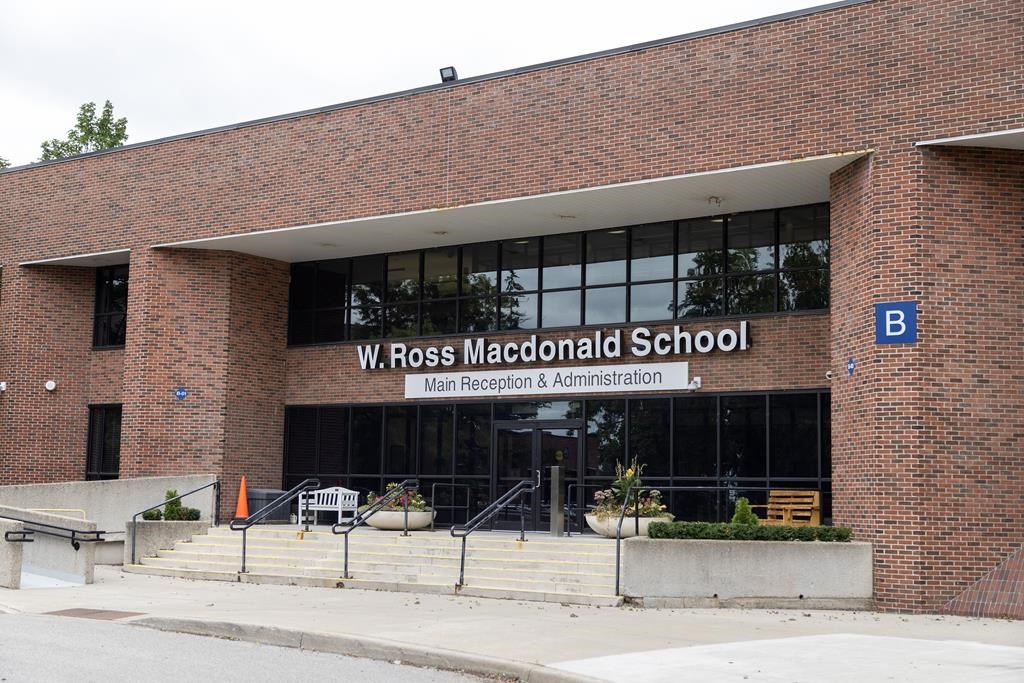The jury at an inquest into the death of a teen who died at a school for blind students has recommended the province review the availability of overnight medical resources provided to schools that cater to disabled children.

Jurors at the inquest into the death of Samuel Brown also suggested the provincial government draft and implement policies to ensure and improve 24-7 on-call availability of medical staff for students who stay at those schools.
The suggestions were among 21 recommendations issued Thursday by jurors who heard the case of 18-year-old Brown, who died five years ago while attending the W. Ross Macdonald School for the Blind in Brantford, Ont.
Brown’s family has said the teen, who was born with a genetic condition that left him blind, deaf and non-verbal, was in good health the weekend before he died at the school.
Less than 12 hours passed between the time the family received a phone call indicating their son was slightly unwell and when Brown was declared dead, his mother testified at the inquest.
Jurors heard that overnight staff at the school were shocked to find Brown unresponsive on the morning of his death after routinely checking on him through the night.
The inquest jury found that Brown died by natural causes, of acute bronchopneumonia.
- Small grocers, co-ops receiving boost from Loblaw boycott: ‘A lot of anger’
- B.C. man losing vision needs to find home for treasured book collection
- U.K. bans generic passwords over cybersecurity concerns. Should Canada be next?
- More foreign interference action coming after inquiry report, India arrests: LeBlanc
Jurors recommended medical training be provided for staff at schools for disabled children on how to identify potential early symptoms of aspiration pneumonia, as well as mandatory training on ableism with a focus on the dangers it poses for those with disabilities.
They also recommended that the schools develop protocols for “ongoing monitoring, documenting, and interdisciplinary consultation among staff regarding noticed changes” in students’ behaviour and medical symptoms.
Jurors further called for a system to verify that overnight bed checks are being completed.
The inquest heard that support staff working at W. Ross Macdonald on Feb. 8 and Feb. 9, 2018 had been checking on Brown at half-hour intervals all night and kept a close eye on him, given he appeared to have cold symptoms the evening before.
Stephanie Rymon-Lipinski, a former student support counsellor at the school, said it was only when she went into Brown’s room at 6 a.m. to change his diaper that staff noticed the teen wasn’t breathing.
Before finding him unresponsive, Rymon-Lipinski reported that Brown appeared “congested” and had a runny nose, but that was not out of the norm for the teen or cause for alarm.
The inquest also heard that there were no nurses or medical staff available overnight at the school once the student health centre _ which diagnosed Brown with a slight fever that evening, gave him Tylenol and cleared him to go back to his residence bed _ closed at 11 p.m.
Another staff member had testified that she took Brown’s temperature around 1 a.m. and it was within the normal range.
The inquest previously heard that Brown _ who had been attending the school since he was four years old _ had difficulty swallowing and had hospital admissions as a child for aspiration, which is when food or liquid enters one’s airways. As a result, most of his food had to be pureed and he had an additional risk of developing pneumonia, which he had been admitted to hospital for in the past.
Dianne Harris, a support staff team leader at the school, told the inquest support staff are not medical professionals who could have recognized apparent or non-apparent signs of pneumonia specifically, and they were not informed of Brown’s history of infection.
A nurse who evaluated Brown at the student health centre the evening before he died testified that she noted nothing abnormal about his lungs, breathing rate or behaviour. She said support staff did a good job monitoring him overnight and she didn’t believe them being informed of his previous pneumonia diagnosis would have changed how they cared for him.
The school now has a strict policy that students be sent home if they are feeling unwell rather than staying overnight, the inquest heard.



Comments